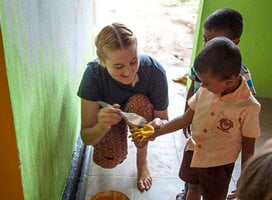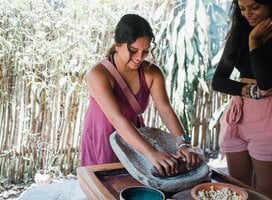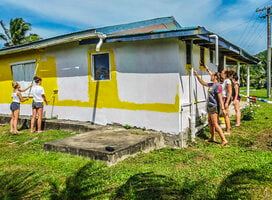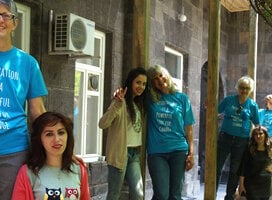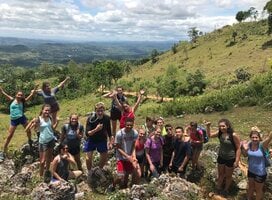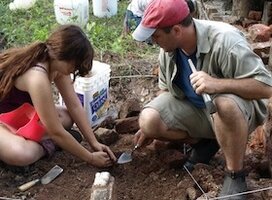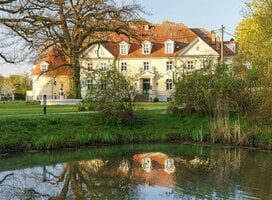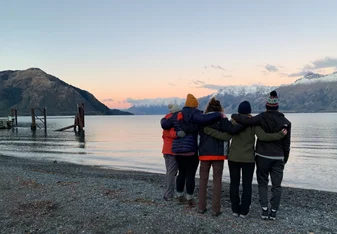Historic Preservation Volunteer Abroad Programs
Historic preservation is a fascinating field that includes many sub-fields, such as archaeology, fine arts, woodcraft, librarianship, architecture, history, and conservation.
Opportunities for volunteering in historic preservation abroad range from short summer programs aimed at high school-aged kids to longer-term internships and work placements. The broad range of programs suit people who already have an interest or expertise in a particular area, as well as total beginners.
If you're still in high school or college, volunteering in historic preservation could open up new and exciting career paths that you may not have considered before.
Short-Term Programs
Short-term programs of two to four weeks are ideal for older high school students or college students earlier in their studies. There are many opportunities for this type of program across Europe, in destinations such as France, Estonia, or the Czech Republic, especially during the summer. The program fee goes towards housing and transportation, and there are usually many other like-minded young travelers from across the world to hang out with and learn from.
College Field Trips
Certain subject areas at college enable students to travel abroad on college-affiliated trips to learn about aspects of historic preservation. If you're majoring in (or planning to major in) subjects such as archaeology, history, anthropology, or museum studies/curating then it's worth investigating whether your prospective college offers field trips to enhance your learning.
Internships
If you're seriously looking at turning an aspect of historic preservation into a career -- perhaps in areas like archaeology, textual archiving, or art restoration -- then an internship is an ideal way to get real-world experience. Internships can be found in museums and art galleries (both big and small) across the world, as well as libraries, university-affiliated centers, private historic foundations, or government-run heritage centers. Unlike participating in shorter programs, you may not meet many other foreigners doing this kind of work, but you will learn how historic preservation operates in real workplaces.
Working Holidays
If you want to spend a bit longer than a couple of weeks in a place and don't mind working out some of the logistics of the trip by yourself, then a working holiday can be a good way to volunteer in historic preservation. Some countries offer working holiday visas for young people (usually those under 30) from certain countries, which allow you to stay longer than a regular tourist and undertake activities that tourists may not be permitted to do. Some organizations, like the UK's National Trust, help make arrangements for working holidays with interested volunteers. Otherwise, you can find an interesting organization -- such as a monastery in India or a museum in France -- and make arrangements yourself.
Everywhere in the world has its own unique challenges when it comes to historic preservation, and there are various kinds of preservation work that volunteers can become involved in depending on the destination.
India
India is an enormous and diverse country with many potential options for getting involved with historic preservation. One particularly worthwhile area is the preservation and refurbishment of Tibetan Buddhist monasteries in Ladakh, a far-northern region of India bordering China. Throughout Ladakh are numerous monasteries built into mountains, many of which are still operational. Some of the older ones contain priceless art and artifacts. Volunteers with an interest in Buddhist art can spend time living and working in monasteries on historic preservation projects.
France
France is full of old medieval buildings -- including castles! -- that are in various states of disrepair. Volunteers in France can find opportunities to work in rural and small-town French communities, helping repair and restore magnificent old buildings with young people from other parts of the world. No prior knowledge or experience is usually needed, but a willingness to do heavy or dirty work outside helps, as does knowledge of woodwork.
Australia
Australia is home to the world's oldest cultures -- those of Aboriginal and Indigenous Australians. Volunteers with an interest in archaeology and rock paintings will be amazed by Australia. Working with Indigenous communities in Central, Western or Northern Australia reveals an entirely different side to Australia than the big-city allure of Sydney or the party scene of Queensland. A serious willingness to understand cultural practices very different from those dominant in the West is necessary when working on historic preservation in Australia.
How to Choose a Historic Preservation Volunteer Program
Selecting the best historic preservation volunteer program largely comes down to your personal interests, skills and experience, and where you would like to go.
Some programs are more geared towards artistic preservation and curating and would be more suitable for volunteers with a fine arts background. Others are more archaeological in focus and would be a good fit for volunteers who like to be outdoors.
If you are a high school or college student, a summer program may be the best option. Short-term programs often allow you to interact with other young people from around the world, so you'll be developing valuable social skills as well as specific vocational skills.
If you've already finished college and are looking to make historic preservation part of your career, then internships or working holiday programs may be a better option. These are usually longer (a few months) and help you develop skills that will be helpful in the workplace.


